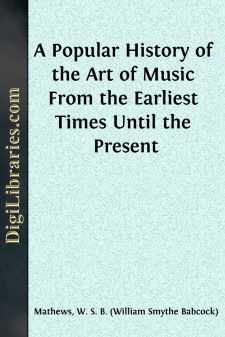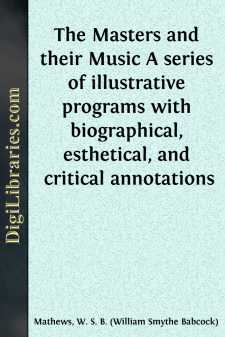Categories
- Antiques & Collectibles 13
- Architecture 36
- Art 48
- Bibles 22
- Biography & Autobiography 815
- Body, Mind & Spirit 144
- Business & Economics 28
- Children's Books 18
- Children's Fiction 14
- Computers 4
- Cooking 94
- Crafts & Hobbies 4
- Drama 346
- Education 58
- Family & Relationships 59
- Fiction 11829
- Games 19
- Gardening 17
- Health & Fitness 34
- History 1378
- House & Home 1
- Humor 147
- Juvenile Fiction 1873
- Juvenile Nonfiction 202
- Language Arts & Disciplines 89
- Law 16
- Literary Collections 686
- Literary Criticism 179
- Mathematics 13
- Medical 41
- Music 40
- Nature 179
- Non-Classifiable 1768
- Performing Arts 7
- Periodicals 1453
- Philosophy 65
- Photography 2
- Poetry 896
- Political Science 203
- Psychology 44
- Reference 154
- Religion 515
- Science 126
- Self-Help 85
- Social Science 82
- Sports & Recreation 34
- Study Aids 3
- Technology & Engineering 59
- Transportation 23
- Travel 463
- True Crime 29
W. S. B. (William Smythe Babcock) Mathews
William Smythe Babcock Mathews (1837–1912) was an influential American music educator, editor, and writer, known for his contributions to the development of music education in the United States. He authored several key works, including "How to Understand Music" and "A Popular History of the Art of Music," which were widely used in teaching music theory and history. Mathews also served as the editor of various music journals, most notably "Music: A Monthly Magazine," where he promoted both classical and contemporary music. His writings helped shape American music education and fostered a deeper appreciation for music among students and the general public.
Author's Books:
Sort by:
INTRODUCTION. I. HE name "music" contains two ideas, both of them important in our modern use of the term: The general meaning is that of "a pleasing modulation of sounds." In this sense the term is used constantly by poets, novelists and even in conversation—as when we speak of the "music of the forest," the "music of the brook" or the "music of nature." There...
more...
PREFACE. When a musical student begins to think of music as a literature and to inquire about individualities of style and musical expression, it is necessary for him to come as soon as possible to the fountainheads of this literature in the works of a few great masters who have set the pace and established the limits for all the rest. In the line of purely instrumental music this has been done by...
more...



